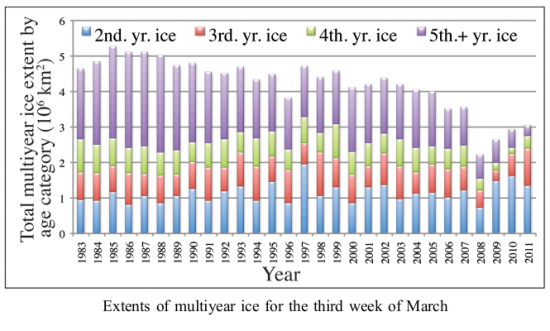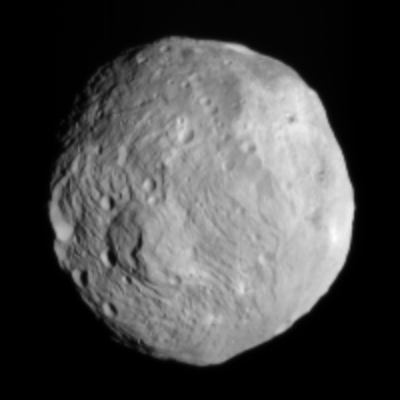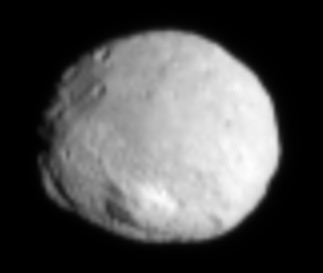Japanese tsunami set record at 132.5 feet high
The March 11th Japanese tsunami was the highest on record, 132.5 feet high.
The March 11th Japanese tsunami was the highest on record, 132.5 feet high.
The March 11th Japanese tsunami was the highest on record, 132.5 feet high.
Some good news: Dawn has returned its first sharp close-up image of Vesta.
The image to below the fold is to me a relief, as it shows that the spacecraft’s camera is fine and that my engineering friends were correct in telling me so. Forgive me for being a skeptical and nervous reporter.
» Read more
NASA to announce on Friday the landing site of Curiousity, the next Mars rover.
The Russians yesterday successfully launched their first space telescope since the fall of the Soviet Union. Here is a Google translation of a Russian article describing Spektr-R’s research goals:
[Spektr-R is] designed to study galaxies and quasars in the radio, the study of black holes and neutron stars in the Milky Way, as well as the regions immediately adjacent to the massive black holes. In addition, using the observatory, scientists expect to receive information about pulsars and the interstellar plasma. It is planned that the “Spektr-R” will work in orbit for at least 5 years.
Though this particular space telescope is probably not going to rewrite the science of astrophysics, its launch is historically significant. It indicates that Russia has just about recovered from the seventy-plus years of bankrupt communist rule that ended in 1990.
» Read more
Now here’s a useful data point: A new poll finds that nearly one-fourth of those polled would give up sex if it meant that they could avoid a PowerPoint presentation.
Dawn enters orbit around Vesta.
In a paper published today in Geophysical Research Letters, climate scientists have estimated the distribution and trends for the Arctic icecap from 1980 through March 2011. What they have found is a significant decline in older ice on top of an overall declining trend that showed a strong but partial recovery since 2008. The graph below, from the paper, illustrates clearly these trends.

What this means for the icecap itself remains unclear. As the scientists themselves note in their conclusion:
» Read more
Leftwing civility: Environmental terrorists destroy genetically modified test plots of wheat and potatoes.
On the night of 9 July, half a dozen masked attackers overpowered the security guard watching over test fields in Gross Lüsewitz, near Rostock. They then destroyed a field of wheat resistant to fungal diseases and a field of potatoes engineered to produce cyanophycin, an amino acid polymer that could potentially be used to make plastics. . . . Two nights later, a dozen attackers threatened guards with pepper spray and bats at a demonstration garden in Üplingen, in the state of Saxony-Anhalt. They destroyed a field of potatoes and trampled wheat and maize.
How did Al Gore miss this important fact? Cats cause global warming!
A new analysis of the orbits of Ceres and Vesta says that in a surprisingly short time those orbits become chaotic and therefore unpredictable. More significantly, those orbits interact with the Earth’s and also make its long term orbit chaotic and unpredictable. From the abstract:
Although small, Ceres and Vesta gravitationally interact together and with the other planets of the Solar System. Because of these interactions, they are continuously pulled or pushed slightly out of their initial orbit. Calculations show that, after some time, these effects do not average out. Consequently, the bodies leave their initial orbits and, more importantly, their orbits are chaotic, meaning that we cannot predict their positions. The two bodies also have a significant probability of impacting each other, estimated at 0.2% per billion year. Last but not least, Ceres and Vesta gravitationally interact with the Earth, whose orbit also becomes unpredictable after only 60 million years. This means that the Earth’s eccentricity, which affects the large climatic variations on its surface, cannot be traced back more than 60 million years ago. This is indeed bad news for Paleoclimate studies. [emphasis mine]
The scientists found that it became impossible to calculate the orbits of the two largest asteroids after only several ten thousand years. They also found that “numerous asteroids in the main belt will behave in the same way with . . . much more chaotic behavior than previously thought.” Worse, the possibility of collisions was far higher than ever thought. Ceres and Vesta have a 1 in 500 chance of colliding with each other every billion years, while other asteroids have chances as low as 1 in 1000.
The importance of this discovery, which still needs to be confirmed by other researchers, cannot be understated.
» Read more

Another image of Vesta from Dawn has been released. This image was taken on July 9 from a distance of 26,000 miles away. It is definitely an improvement over the previous image, with more small details becoming visible. However, I once again wonder about the softness of the image. Look at the limb of the planet. It is soft against the black sky. This is not what one would expect from perfectly focused camera.
Dawn goes into orbit around Vesta next week. We sure learn then for sure if there is a problem with its camera, or whether I am merely being a bit too nervous.
Astronomers have found two new brown dwarf stars only 15 and 18 light years away.
Most brown dwarfs have reached surface temperatures below the “oven temperature” of about 500 Kelvin (about 230 degrees Celsius), may be even as cool as the temperature at the surface of the Earth. The search for these elusive neighbours of the Sun is currently in full swing. It cannot be excluded that ultracool brown dwarfs surround us in similar high numbers as stars and that our nearest known neighbour will soon be a brown dwarf rather than Proxima Centauri.
The second ARTEMIS space probe will enter lunar orbit on Sunday.
“With two spacecraft orbiting in opposite directions, we can acquire a full 3-D view of the structure of the magnetic fields near the moon and on the lunar surface,” said Vassilis Angelopoulos, principal investigator for the THEMIS and ARTEMIS missions and a professor of space physics at UCLA. “ARTEMIS will be doing totally new science, as well as reusing existing spacecraft to save a lot of taxpayer money.”
White dwarf stars in a dance of death.
[The binary pair of] white dwarfs are so near they make a complete orbit in just 13 minutes, but they are gradually slipping closer together. About 900,000 years from now – a blink of an eye in astronomical time – they will merge and possibly explode as a supernova. By watching the stars converge, scientists will test both Einstein’s general theory of relativity and the origin of some peculiar supernovae.
The two white dwarfs are circling at a bracing speed of 370 miles per second (600 km/s), or 180 times faster than the fastest jet on Earth. “I nearly fell out of my chair at the telescope when I saw one star change its speed by a staggering 750 miles per second in just a few minutes,” said Smithsonian astronomer Warren Brown, lead author of the paper reporting the find.
The brighter white dwarf contains about a quarter of the Sun’s mass compacted into a Neptune-sized ball, while its companion has more than half the mass of the Sun and is Earth-sized. A penny made of this white dwarf’s material would weigh about 1,000 pounds on Earth. Their mutual gravitational pull is so strong that it deforms the lower-mass star by three percent. If the Earth bulged by the same amount, we would have tides 120 miles high. [emphasis mine]
I’ve posted earlier about Dawn’s approach to Vesta. However, in looking at the images from Dawn, it dawned on me recently that they seems more fuzzy for what you’d normally expect from a space probe. I am now wondering if there is something fundamentally wrong with Dawn’s camera, causing its images to be slightly out of focus.
New evidence bolsters the asteroid impact theory of dinosaur extinction 65 million years ago.
I am sure you all thought the cause of the dinosaurs’ extinction — an asteroid impact on the Yucatan peninsula — was settled science. Wrong!
» Read more
Starvation, scurvy, or lead poisoning? A skeleton from the 1848 Franklin Expedition to the Arctic may tell scientists what caused the expedition’s destruction.
Neptune has just completed its first orbit around the sun since its discovery in 1846. And the Hubble Space Telescope has taken some pictures in celebration.
Al Gore has announced a new campaign “to broadcast the reality of the climate crisis and mobilize citizens to help solve it.”
And I ask: what the hell does a propaganda campaign tell us about the climate? The answer: nothing. Just because you say so, Al, does not make it so.
On another note, satellite data continues to show absolutely no warming for the past decade.
Interested in caves on other worlds? You might want to attend the First International Planetary Caves Workshop to be held October 25-28, 2011 in Carlsbad, New Mexico.
Underwater Antarctic volcanoes discovered in the Southern Ocean.
In the realm of science, when a computer model is contradicted by empirical observation, the model is deemed to have been refuted. Only in the field of global climate do purported scientists refuse to recognize that basic principle.
Titan’s ethane lakes in a red haze.
So far, there are no recognisable signs of organic life. That’s not surprising: by terrestrial standards, Titan is a deep freeze with surface temperatures at a chilly -180°C. Yet Titan is very much alive in the sense that its atmosphere and surface are changing before our eyes. Clouds drift through the haze and rain falls from them to erode stream-like channels draining into shallow lakes. Vast dune fields that look as if they were lifted from the Sahara sprawl along Titan’s equator, yet the dark grains resemble ground asphalt rather than sand. It is a bizarrely different world that looks eerily like home. Or as planetary scientist Ralph Lorenz puts it: “our prototype weird-world exoplanet”.
Confessions of a moon rock thief.
And in a related story: Fish captain fights to keep long-missing moon rock.
A new study has found new evidence that dinosaurs were warm-blooded and active, unlike modern reptiles. Even more surprising,
“The dinosaurs appeared to be even more active than the mammals. We certainly didn’t expect to see that. These results provide additional weight to theories that dinosaurs were warm-blooded and highly active creatures, rather than cold-blooded and sluggish.”
A paper published today on the Los Alamos astro-ph preprint website has attempted to model the habitable zones within the Milky Way galaxy. From the abstract:
We predict that ~1.2% of all stars host a planet that may have been capable of supporting complex life at some point in the history of the Galaxy. Of those stars with a habitable planet, ~75% of planets are predicted to be in a tidally locked configuration with their host star. The majority of these planets that may support complex life are found towards the inner Galaxy, distributed within, and significantly above and below, the Galactic midplane.[emphasis mine]
They took into consideration the hazard of supernovae for killing off planetary life, as well as other factors such as the where the necessary heavier elements would be available for producing planets.
You can download the paper here [pdf].
The highest water level in a decade is expected at Lake Powell by August.
Lake Powell’s rising water level is a result of the long and wet winter this year. An above-average snowpack, with late snows and unseasonably cold weather has lead to a slower melt than usual. As of May, the snowpack that feeds Lake Powell was 30 percent higher than average, with only 50 percent of the accumulated snowpack melted. [emphasis mine]
I thought Al Gore told us this wasn’t going to happen anymore.
Dawn continues to approach the large asteroid Vesta. Below is an image taken July 1st from about 62,000 miles. The image has a resolution of 5.8 miles per pixel.
Despite Vesta’s large size, 330 miles in diameter, it is nonspherical. This fact, combined with data that says it is differentiated with a core and mantle, suggests that it is the remains of a larger object that subsequently broke up.
